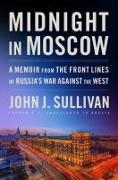Midnight in Moscow
BücherAngebote / Angebote:
A memoir of service by the most recent U.S. ambassador to Moscow, John Sullivan, who was on the diplomatic front lines when Putin invaded Ukraine—and who is now presenting the first behind-the-scenes account of how U.S.-Russia relations hit their nadir, and explaining where we can go from here. For weeks before the invasion of Ukraine, U.S. Ambassador to Russia John Sullivan was warning that it would happen. When troops finally crossed the border, he was woken in the middle of the night by an employee at Embassy Moscow with a prearranged code. The signal was even more bracing than the cold of that February night: it meant that Sullivan needed to collect his bodyguards and get to the embassy as soon as possible. The war had begun, and U.S.-Russia relations would never be the same. In Midnight in Moscow, Sullivan offers a memoir of his last post, as well as a broader argument about how our relationship with Russia has deteriorated over the past three years and where it’s going. His arrival in Moscow coincided almost exactly with a dramatic series of escalations by the Kremlin. He saw firsthand how the Russian leadership repeatedly lied about their intentions to invade Ukraine in the weeks leading up to the attack—while also devoting huge numbers of personnel and vast resources to undermining the U.S. diplomatic presence in Russia. But it was not until Vladimir Putin gave the order to launch a full-scale invasion of Ukraine on February 25, 2022 that Sullivan had to admit that Russia was not just at war with its neighbor: it was also at war, in a very real sense, with the United States, and with everything that it represents. Russian leaders’ treachery and naked hostility, he says, is definitive proof that there can be no negotiation with Putin’s regime or with the Russians at large until their government is thoroughly transformed. A unique perspective on a pivotal moment in world history, Midnight in Moscow also draws shocking historical parallels to explain why we need to stand up to Moscow—and how far we should be prepared to go in that confrontation.
Erscheint im Juli
